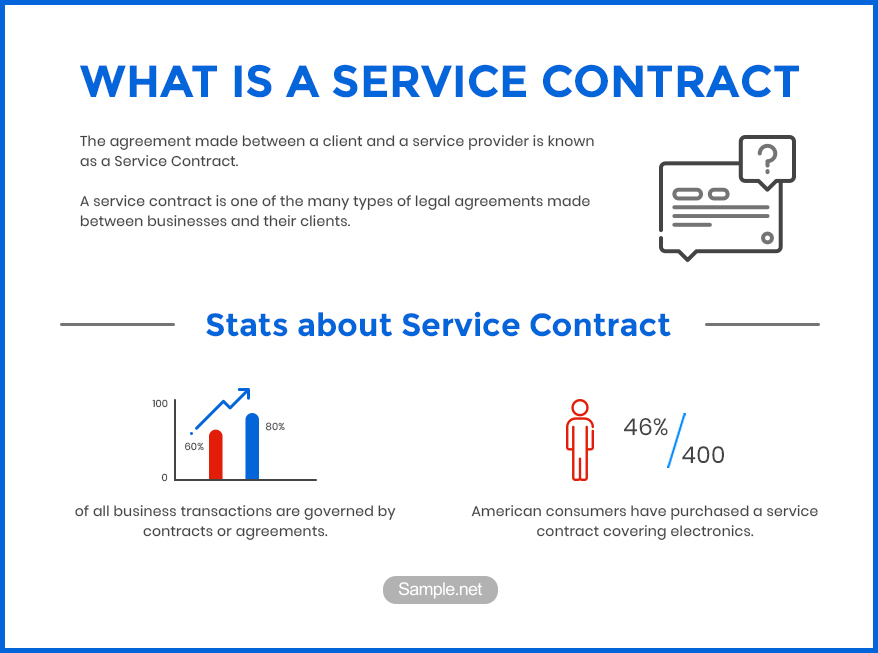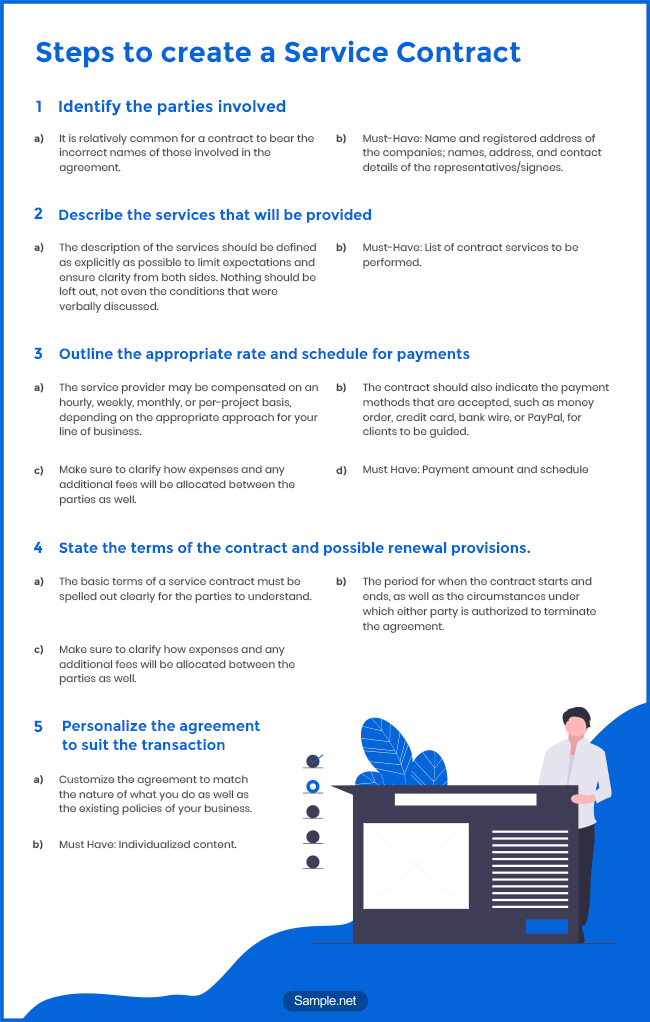75+ Sample Service Contract Templates
Below are service contract examples used between a client or customer and a service provider to successfully carry out a business arrangement.
-
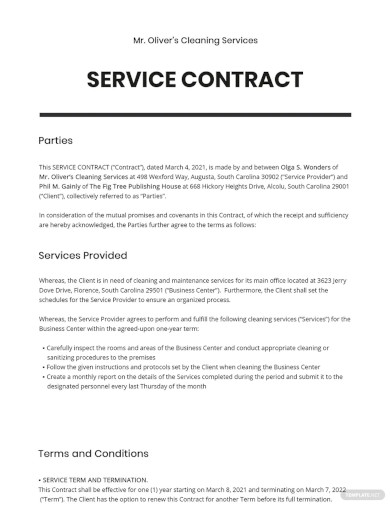
Service Contract Template
download now -
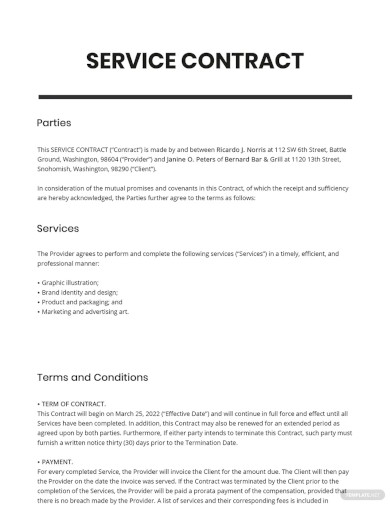
Simple Service Contract Template
download now -
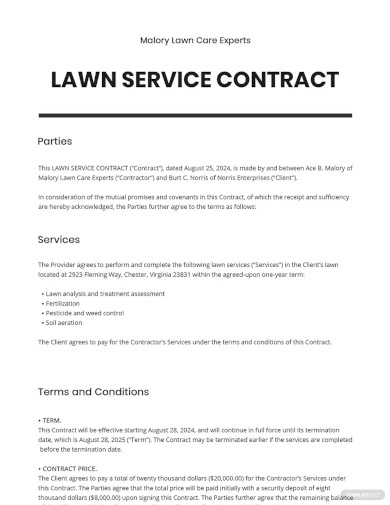
Lawn Service Contract Template
download now -
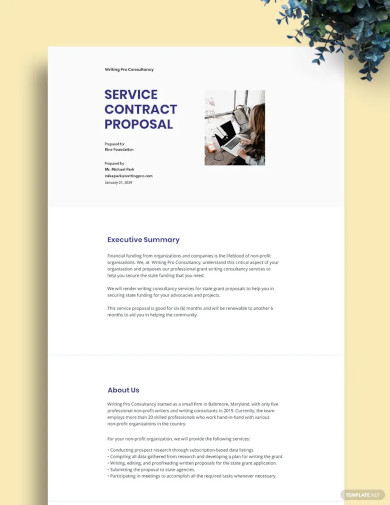
Service Contract Proposal Template
download now -
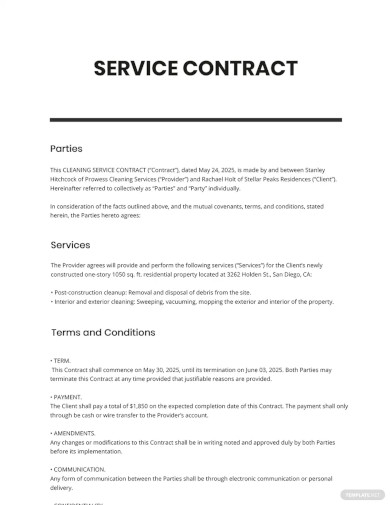
Cleaning Service Contract Template
download now -
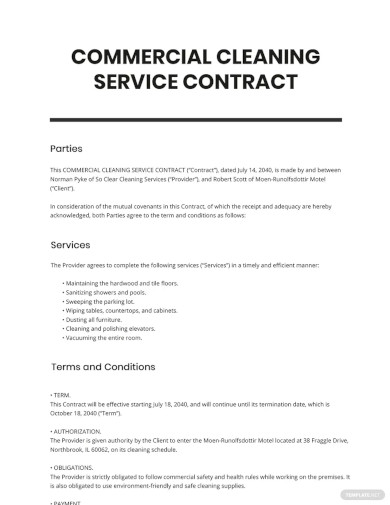
Commercial Cleaning Service Contract Template
download now -
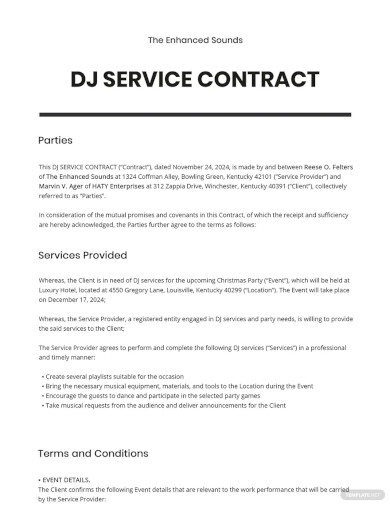
DJ Service Contract Template
download now -
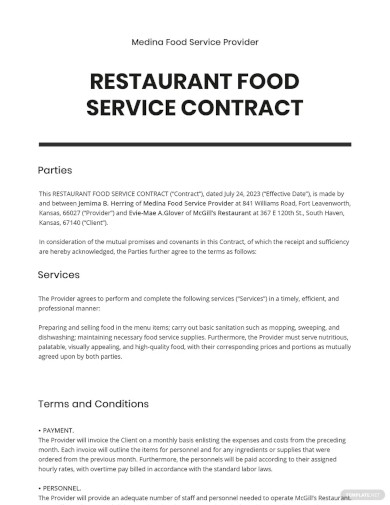
Restaurant Food Service Contract Template
download now -
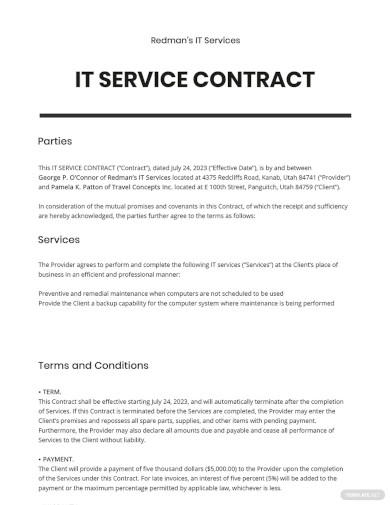
IT Service Contract Template
download now -
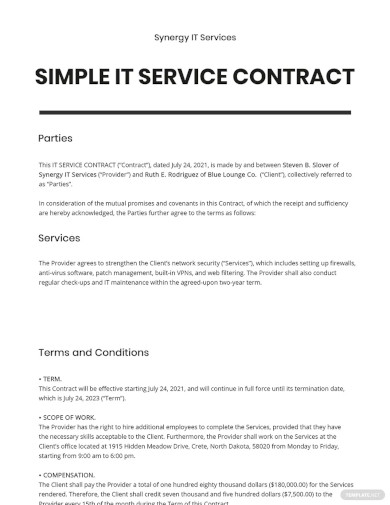
Simple IT Service Contract Template
download now -
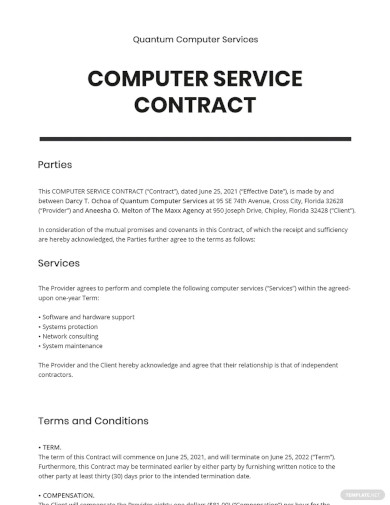
Computer Service Contract Template
download now -
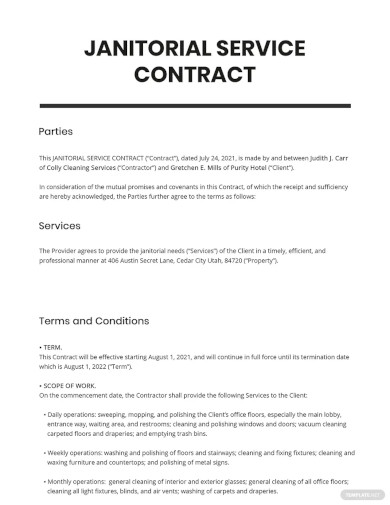
Janitorial Service Contract Template
download now -
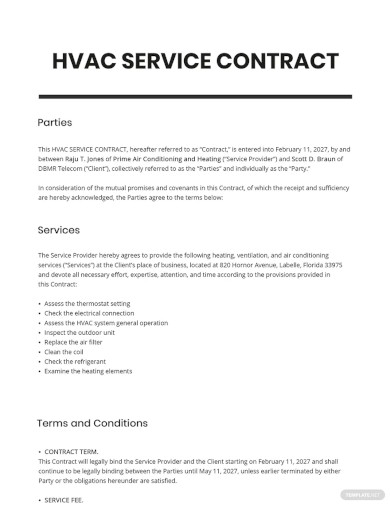
HVAC Service Contract Template
download now -
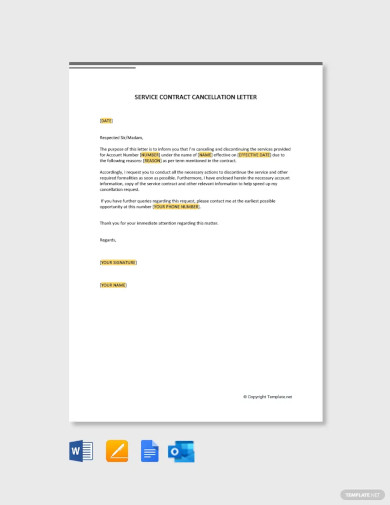
Service Contract Cancellation Letter Template
download now -
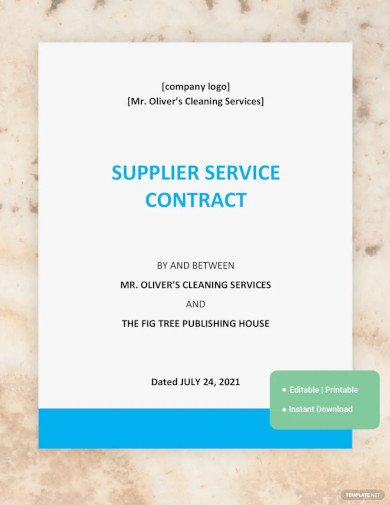
Supplier Service Contract Template
download now -
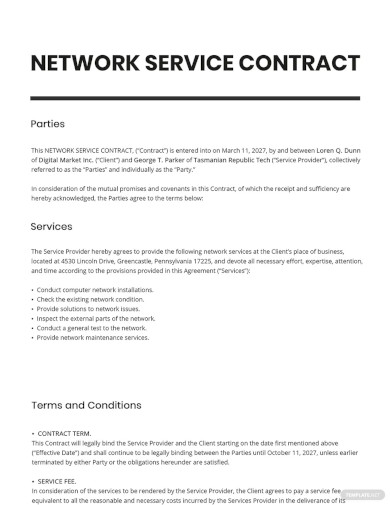
Network Service Contract Template
download now -
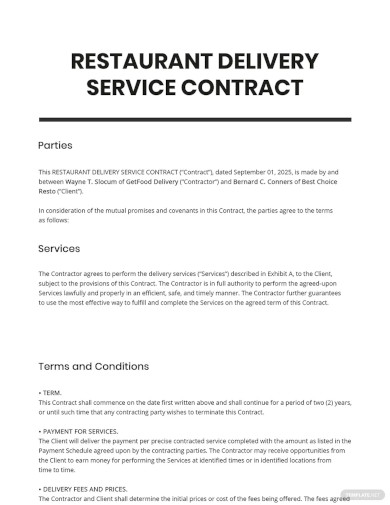
Restaurant Delivery Service Contract Template
download now -
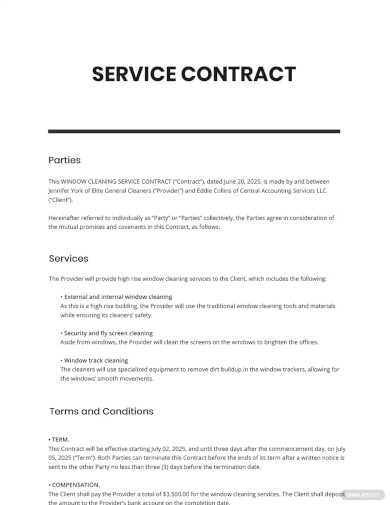
Free Window Cleaning Service Contract Template
download now -
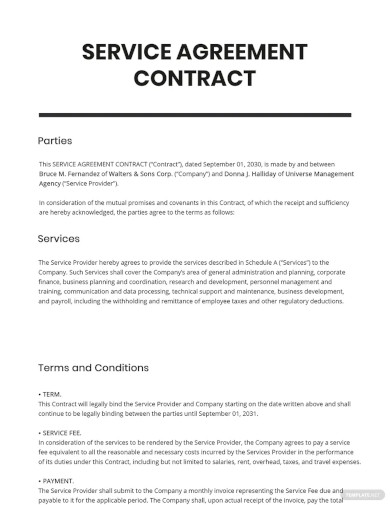
Service Agreement Contract Template
download now -
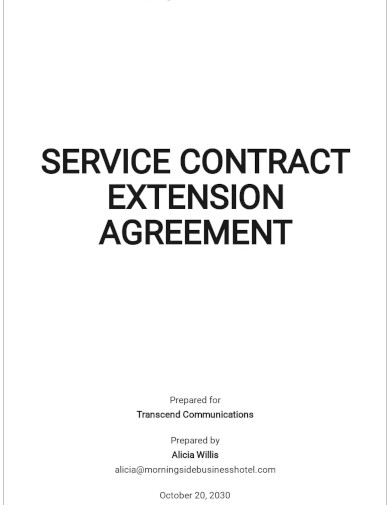
Service Contract Extension Agreement Template
download now -
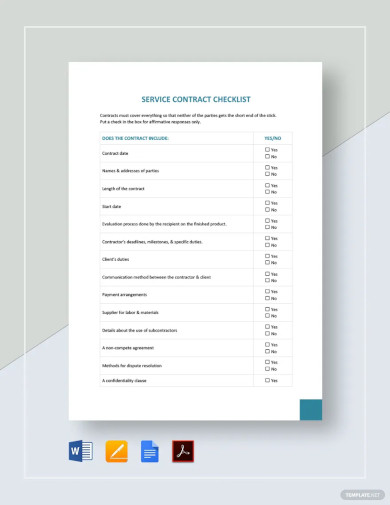
Service Contract Checklist Template
download now -
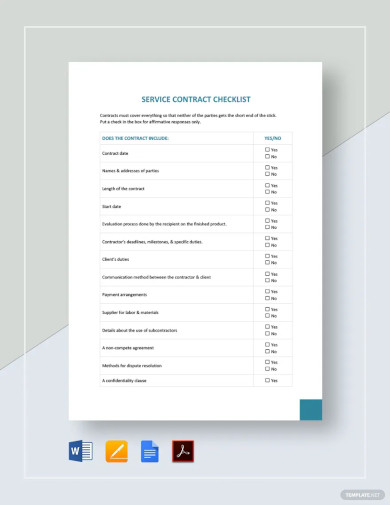
Service Contract Offer Letter Template
download now -

Basic Service Contract Template
download now -

Free DJ Service Contract Template
download now -

General Lawn Service Contract Template
download now -
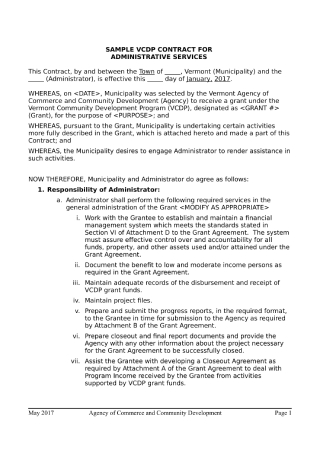
Administrative Services Contract
Specify the duties, duration, and hourly rate of your administrative services in a contract.
-
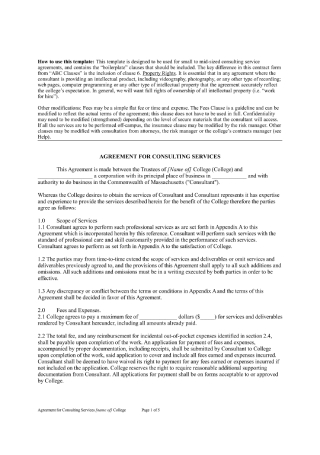
Agreement for Consulting Services
Define the legal relationship between you and a client in a consulting agreement.
-

Agreement for Design Services
Get paid for your design services with the help of a detailed agreement.
-
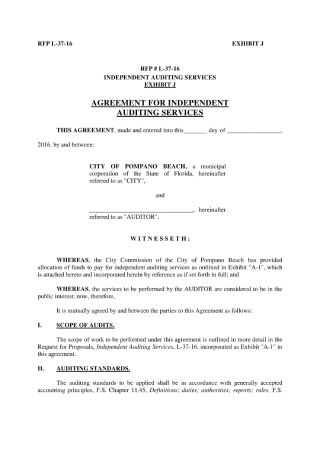
Agreement for Independent Auditing Services
Ensure the safe examination of financial records and practices through a service agreement.
-
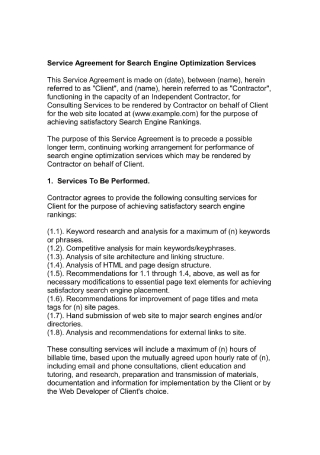
Agreement for Search Engine Optimization Services
Safeguard your interests as an SEO company or consultant with the use of a contract.
-
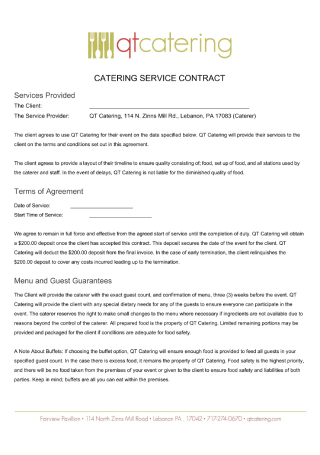
Catering Service Contract
Define the details of a catering service in a contract.
-
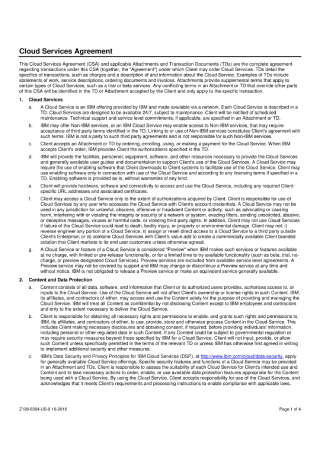
Cloud Service Agreement
Detail the specifics of a transaction in regards to Cloud services in a contract.
-
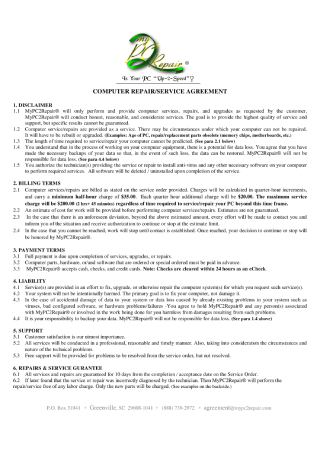
Computer Repair and Service Agreement
Ensure that both parties are clear on the terms of repair and service using an agreement.
-
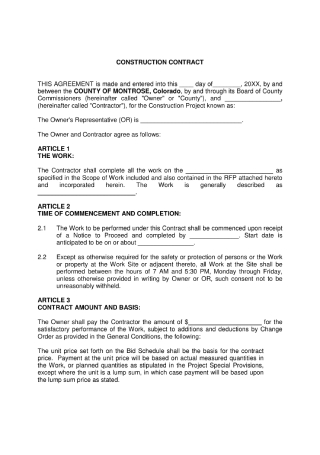
Construction Services Contract
Indicate the responsibilities of each party in the construction process in a contract.
-
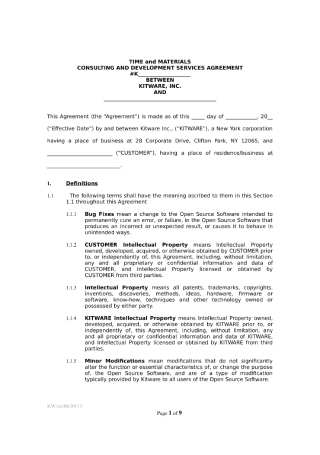
Consulting and Development Services Agreement
Protect your rights and resources by having a service agreement in place.
-
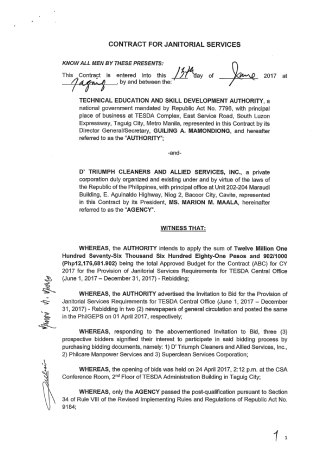
Contract for Janitorial Services
Establish the terms and conditions of your cleaning arrangement in a service contract.
-
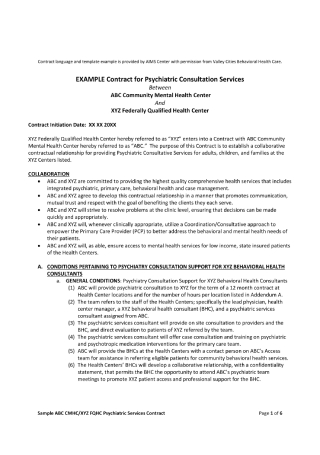
Contract for Psychiatric Consultation Services
Contract psychiatric consultation services by stating your provisions in a written document.
-
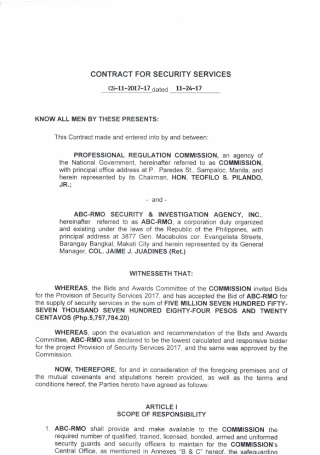
Contract for Security Services
Set out the terms of the security system agreed by both parties in a contract.
-
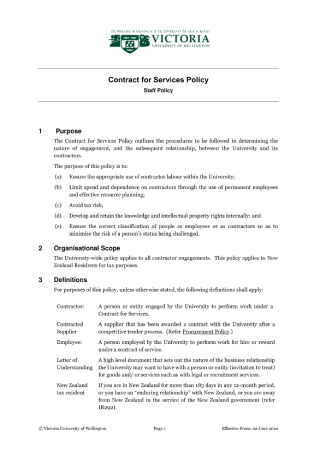
Contract for Services Policy
Outline the procedures in determining the nature of the agreement using this sample.
-

Contractor Services Agreement
Provide legal protection to the service provider and the employer with a service agreement.
-
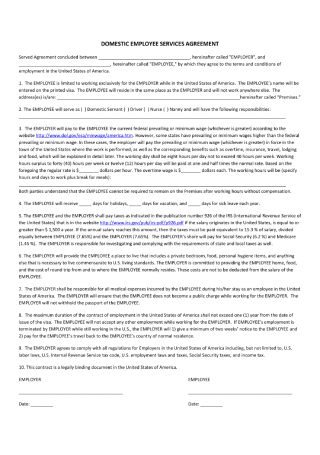
Domestic Employee Services Agreement
Prepare an agreement to cover the services to be rendered by an individual upon employment.
-
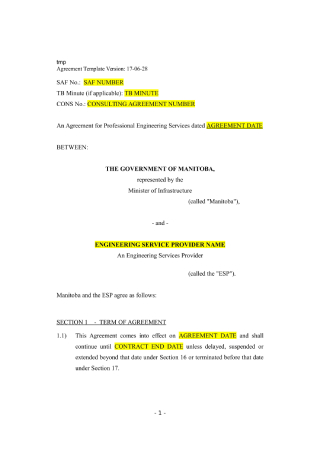
Engineering Services Contract
Offer your engineering services to clients by stating your terms in a contract.
-
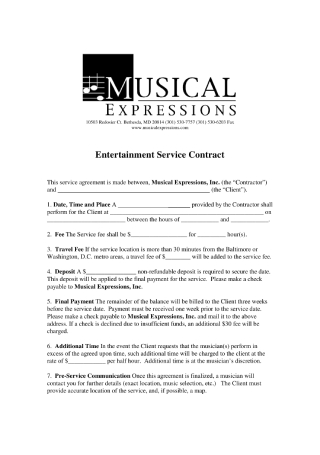
Entertainment Service Contract
Clarify the agreement made for entertainment services in a contract.
-
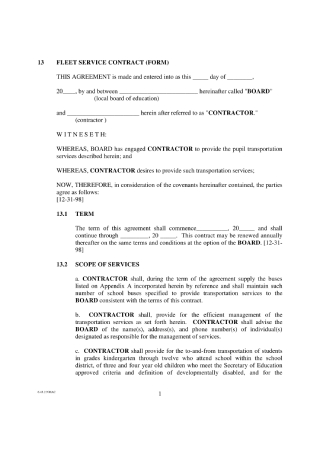
Fleet Service Contract
Ensure the regular maintenance and repair of your vehicle with a fleet service contract.
-

Freelance Service Contract
Describe the services to be performed by a freelancer for a client in a contract.
-
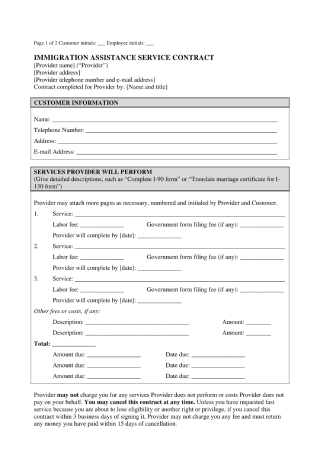
Immigration Assistance Service Contract
Provide immigration assistance to clients by using a contract for security.
-
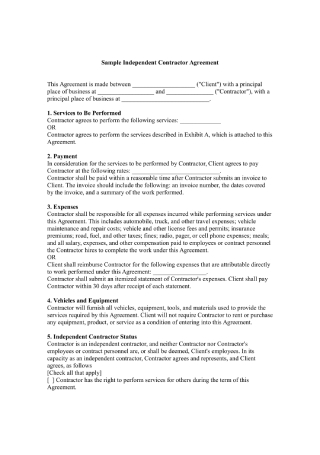
Independent Contractor Agreement
Write an agreement to identify the scope of the work to be performed by each party.
-
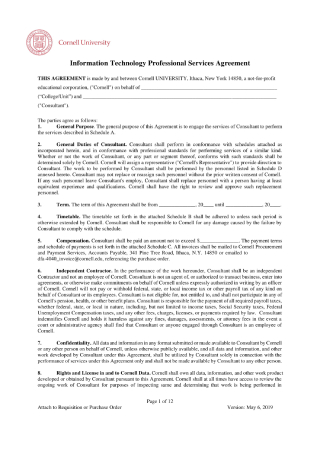
Information Technology Professional Services Agreement
Facilitate your business arrangement for IT transactions with a service agreement.
-
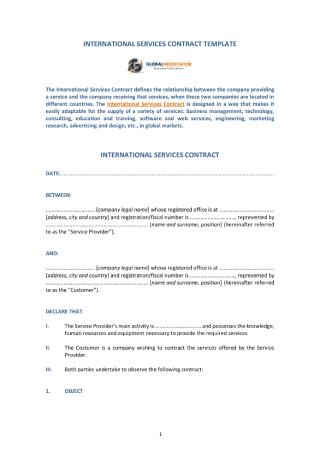
International Services Contract
Determine the commercial relationship between you and a client through a service contract.
-

IT Managed Services Contract
Perform effective IT services with the help of a well-crafted service contract.
-
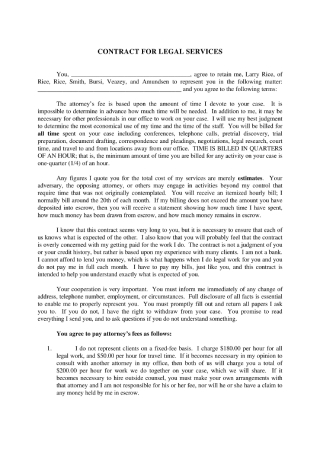
Legal Services Contract
Create a contract to document the terms of the legal service provided by one party to the other.
-
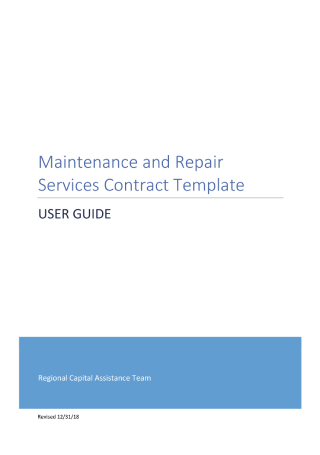
Maintenance and Repair Services Contract
Secure the regular maintenance and repair of facilities with the help of a contract.
-
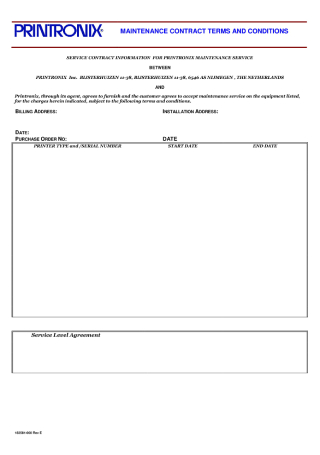
Maintenance Service Contract
Make sure you’re on the same page with the maintenance contractor by using a contract.
-
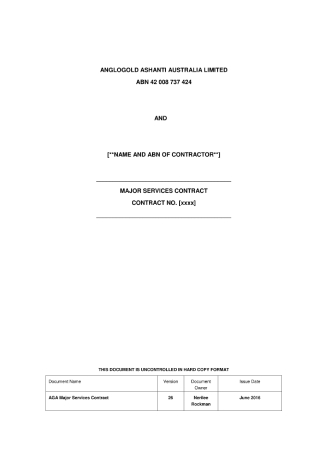
Major Services Contract
Govern major transactions and business deals with a service contract.
-
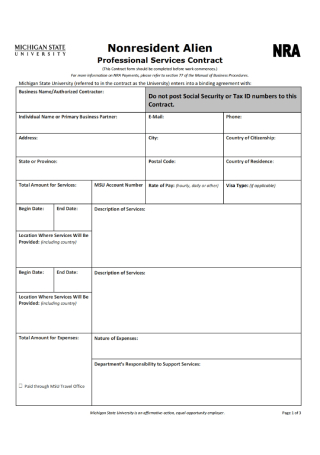
Nonresident Alien Professional Services Contract
Settle NRA payments accordingly through the service contract provided.
-
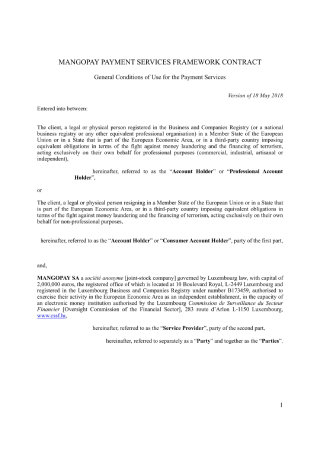
Payment Services Framework Contract
Manage the execution of individual and successive payment transactions through a contract.
-
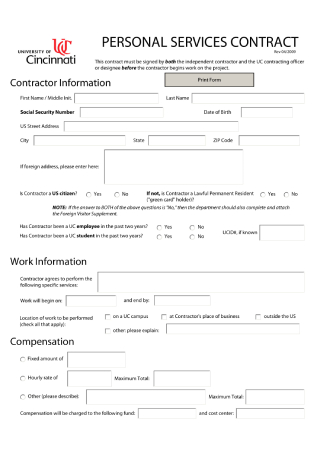
Personal Services Contract
Summarize an employer-employee relationship in a personal service contract.
-

Pool and Spa Maintenance Contract
Schedule the regular maintenance of pool and spa facilities by enclosing your terms in a contract.
-
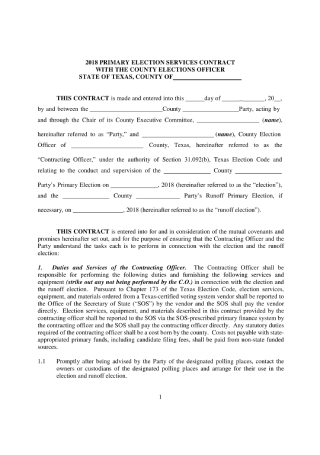
Primary Election Services Contract
Prepare a contract to guide each party in understanding their obligations in election duties.
-
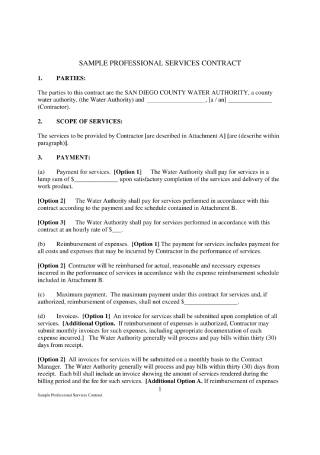
Professional Service Contract
Hire a contractor to perform specialized, project-based services using a contract.
-
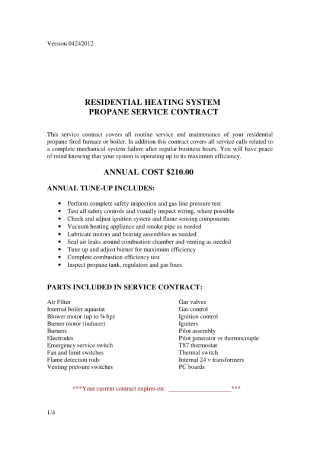
Propane Service Contract
Note all routine service and maintenance of propane-fired equipment in a contract.
-
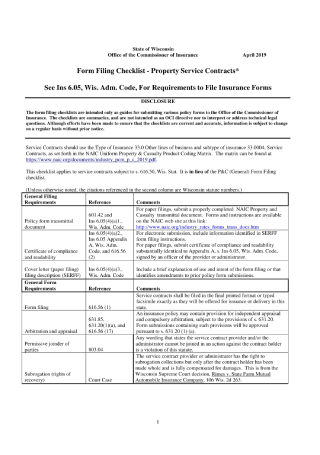
Property Service Contract Checklist
Create a legally binding property service contract with the help of this sample.
-
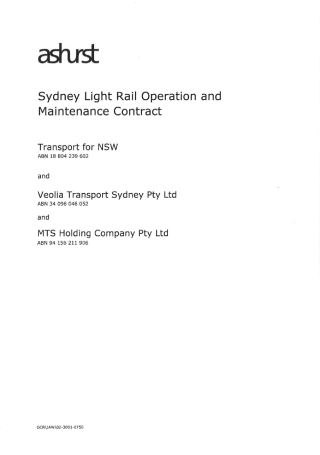
Rail Operation and Maintenance Contract
Govern the operation and maintenance of the local rail system with the use of a contract.
-
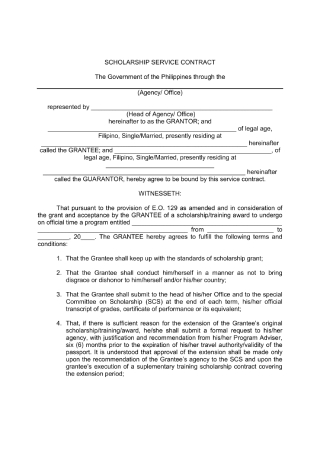
Scholarship Service Contract
Lay out the requirements for a scholarship grant in a service contract.
-
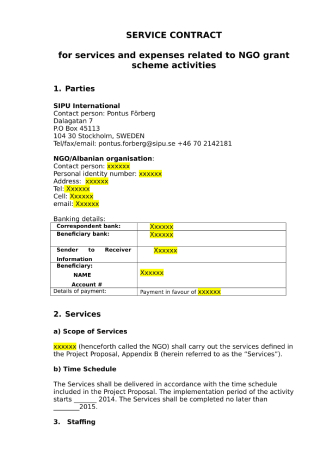
Service and Expenses Contract
Describe the scope of the job to be provided by the concerned parties in a contract.
-
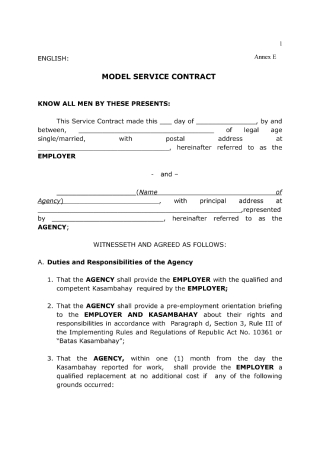
Service Contract for Private Agency
Use a service contract to define the obligations and responsibilities of all parties in agreement.
-
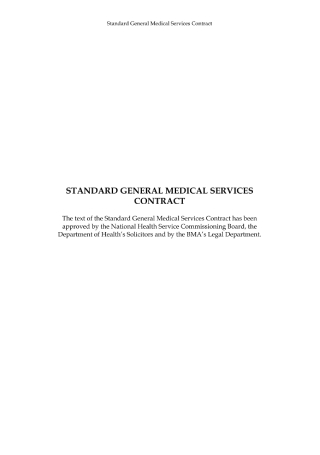
Standard General Medical Services Contract
Reflect the general medical services provided by professionals in a contract.
-
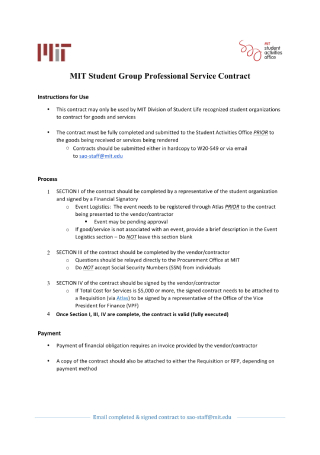
Student Group Professional Service Contract
Contract for the goods being received or services to be rendered in an agreement.
-

Support Services Agreement
Establish a support service agreement with an external vendor using this sample.
-

Telemetry Service Contract
Conclude a formal agreement with a service contract for telemetry services.
-
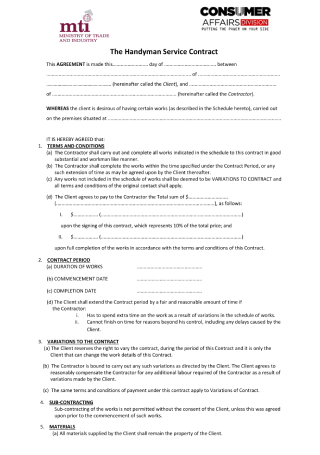
The Handyman Service Contract
Establish what needs to be done and who’s responsible for doing it with a service contract.
-
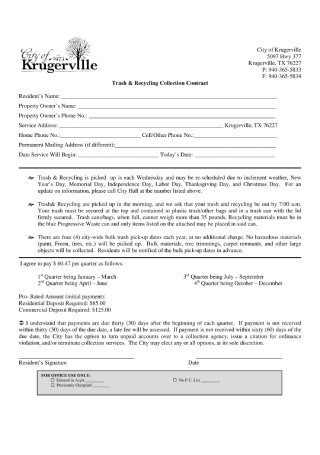
Trash and Recycling Collection Contract
Draft a contract for your community’s waste collection services through this sample.
-
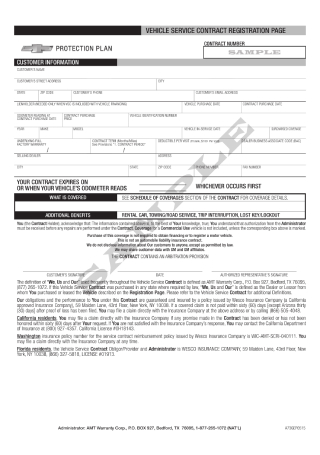
Vehicle Service Contract
Protect customers against unexpected and costly vehicle repairs with a service contract.
-
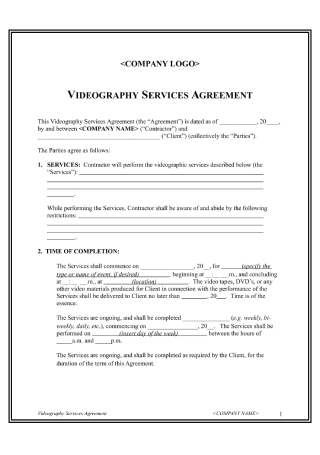
Videography Services Agreement
Outline payment terms on scheduled deliverables for your videography services in a contract.
-
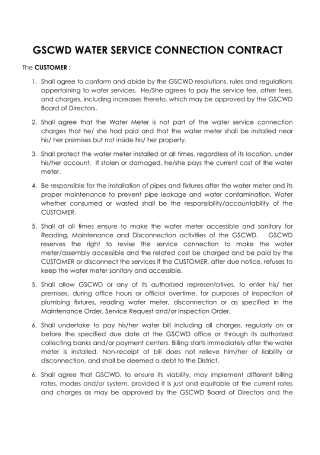
Water Service Connection Contract
Inform clients of the terms and requirements of your water service connection in a contract.
-

Service Contract Inventory Template
download now
“60–80% of all business transactions are governed by SAMPLE contracts or agreements.”
“46% of 400 American consumers have purchased a service contract covering electronics.”
What Is a Service Contract?
When a contractor agreements to perform a particular service in exchange for compensation, the terms and conditions of that agreement are reflected in a standard contract. The agreement made between a client and a service provider is usually documented in writing to ensure that the dos and don’ts of the arrangement are clearly defined for both parties to comprehend. This includes the obligations, duration of service, payment schedule, and other stipulations that must be noted.
Types of Service Contracts
There are several types of service contracts that are deemed enforceable when written correctly. These professional contracts are defined by the kind of work one is hired to do along with how the service provider is compensated.
How to Make an Enforceable Service Contract?
While verbal agreements may be enforceable, certain kinds of contracts must be put into writing as mandated by the Statute of Frauds (also known as contract law). Creating a written contract allows you to outline each party’s expectations and obligations in full detail. This will help you define the scope of the job, the fees for the services to be provided, when and how the contract may be terminated, and other relevant provisions that both parties must read and understand before signing. So to draft a legally binding service contract, take note of the following guidelines.
Step 1) Identify the parties involved.
It is relatively common for a contract to bear the incorrect names of those involved in the agreement. A 2013 case between Derek Hodd Limited and Climate Change Capital Limited illustrates just how important it is to correctly identify the contracting parties. Here, the defendant allegedly owed the claimant approximately £142,000 in unpaid fees but the latter had mistakenly used the wrong company name from the Companies House website, which then made it difficult to prove that a formal agreement existed between the two parties. Although the court’s rule favored the claimant’s request, the whole case still serves as a valuable lesson to individuals and business entities that wish to enter into a contract.
Must-Have: Name and registered address of the companies; names, address, and contact details of the representatives/signees
Step 2) Describe the services that will be provided.
The description of the services that the company will provide is probably the most crucial part of the contract. These services should be defined as explicitly as possible to limit expectations and ensure clarity from both sides. Nothing should be left out, not even the conditions that were verbally discussed. Any additional requirements that were proposed by the client may be included in the contract before it is signed. But if these changes occur after the final draft was made, you can always create a written amendment to account for it. Extra services and related fees must also be expressed to avoid further issues.
Must-Have: List of contract services to be performed
Step 3) Outline the appropriate rate and schedule for payments.
When it comes to service contracts, a price structure and a payment schedule are typically reflected in the document for reference. The service provider may be compensated on an hourly, weekly, monthly, yearly, or per-project basis, depending on the appropriate approach for your line of business. The contract should also indicate the payment methods that are accepted, such as money order, credit card, bank wire, or PayPal, for clients to be guided. Make sure to clarify how expenses and any additional fees will be allocated between the parties as well. Negotiations on expenses and fees that go beyond the usual price can be done and elucidated in the contract to maintain transparency.
Furthermore, to avoid untimely payments that may affect the delivery of service, you can specify possible penalties for late payments or missed deadlines. You can also propose an expense budget so that any materials to be used during the repair, maintenance, or operation of the service can be properly discussed beforehand.
Must-Have: Payment amount and schedule
Step 4) State the terms of the contract and possible renewal provisions.
The basic terms of a service contract must be spelled out clearly for the parties to understand. This includes the period for when the contract starts and ends, as well as the circumstances under which either party is authorized to terminate the agreement. Although a service contract usually concludes as soon as it reaches the end of its warranty or its specified end date, the client or the service provider does have the power to terminate the contract under reasonable conditions. For instance, if a car dealer fails to perform its obligations in a vehicle service contract, the other party may terminate the contract or take matters to court without violating the agreement. It’s always best to have a contingency plan in place to properly handle disputes and keep matters from being brought to court.
Must-Have: Terms and conditions of the contract; renewal clause or life insurance policy
Step 5) Personalize the agreement to suit the transaction.
Every contract is different. Even with a contract template available for you to fill in the blank and use, customizing the agreement to match the nature of what you do as well as the existing policies of your business is an absolute must. Service contracts that remain impartial in whatever circumstance always have a better chance of getting signed. If the rights of the other party are clearly defined and valued in the agreement, the service contract will likely be accepted for the deal to follow through.
Must-Have: Individualized content
Service Contract vs Service Agreement
All contracts are agreements, but not all agreements are contracts. Though the key differences between them are minor, it’s important to know which legal document would best satisfy our needs. In essence, the content of a service contract is more formal and rigorous compared to the terms presented in a service agreement. Unlike a service agreement, it must involve the mutual exchange of promises between all parties concerned. But because service contracts are legally binding, the court has the authority and obligation to enforce its terms, which can only be possible with a service agreement if it contains the necessary elements of a valid contract. This will then protect the parties in the event of a breach or dispute.
The Dos and Don’ts of a Service Contract
A comprehensive contract must consist of several components for it to be enforceable in court. While some service contracts can be as simple as an employment contract, complex contracts such as HVAC service contracts and computer service contracts have higher stakes you don’t want to risk. With that said, here are some suggestions for what to do and what not to do when drafting a service contract.
Dos
1. Do use simple headings.
Make it easy for readers to find particular clauses in the contract by using common-sense headings that can easily be remembered. This is one way to make references to a previous provision rather than being repetitive with your message.
2. Do number paragraphs.
There are instances when pointing to specific provisions in your business contract is essential to support your claims. But instead of stating the entire section word for word, it’s best to number each paragraph for a quick reference. Having to scan through the entire document to find the exact clause being referred to can be time-consuming to do. But by following this method, terms are easily clarified for all parties to benefit from.
3. Do consider the standards of labor law and contract law.
Service employees play a huge role in most service contracts. In a janitorial service contract, for example, the janitor is responsible for carrying out the tasks and obligations that were discussed and agreed upon. This also means that the company would have to adhere to the Service Contract Law and make sure that the janitor is compensated no less than the prevailing wage rate in the locality. Otherwise, the service employee may use the contract as proof of your ignorance of the law.
Note that under Article I, section 10, clause 1 of the US Constitution — popularly known as the Contract Clause — the government can prohibit the formation of contracts that violate public policy. So despite the Obligation of Contracts acknowledged by The Constitution, a service contract may only be enforced if activities are considered legal in respect to state regulations.
4. Do review the correct use of conjunctions.
This pertains to all conjunctions, but focuses primarily on the coordinating conjunctions “and” and “or.” The words you choose can have a dramatic impact on the meaning of a sentence. Even if you mean one thing yet your statement depicts otherwise, what’s found in the four corners of the contract will always be favored.
Don’ts
1. Don’t forget to punctuate.
The proper placement of punctuation marks is crucial in contract writing ? or communication, in general. Misplaced commas can drastically change the meaning of a sentence and how readers understand it. Misinterpretation is a common problem in contract writing, so it’s important to avoid simple grammar mistakes by constructing your statements carefully.
2. Don’t assume that readers define certain words the way you do.
In some cases, it may be necessary to use technical terms or to speak in legalese to properly convey your points. But there’s no guarantee that readers will understand these terms based on what you intend to communicate, even when used in the right context. Thus, it may be necessary to include a definition in the contract to keep parties informed.
3. Don’t write wordy sentences.
It’s best to break down large chunks of information into easily digestible thoughts. Long, complex sentences often leave room for ambiguity, which can then cause parties to comprehend your words differently from what was intended.
4. Don’t agree to any modifications without memorializing it in writing.
If you wish to add or change certain provisions in the contract, be sure to have them recorded through a written amendment. Contract modification occurs when the parties agree to revise any of the terms stated in the original agreement. For it to be considered valid, all parties must agree to the ensuing changes.
At the end of the day, service contracts are necessary for the business world to function as it does. This is something that businesses can benefit from to prevent misunderstandings and reduce the risks of litigation. Hence, knowing how to write a service contract with the assistance of a knowledgeable attorney is sure to hasten the process and lead to successful business transactions. You can find a lot of resources to put together a service contract without starting from scratch, just make sure to personalize the editable and printable version of the service agreement template prior to getting it signed.

